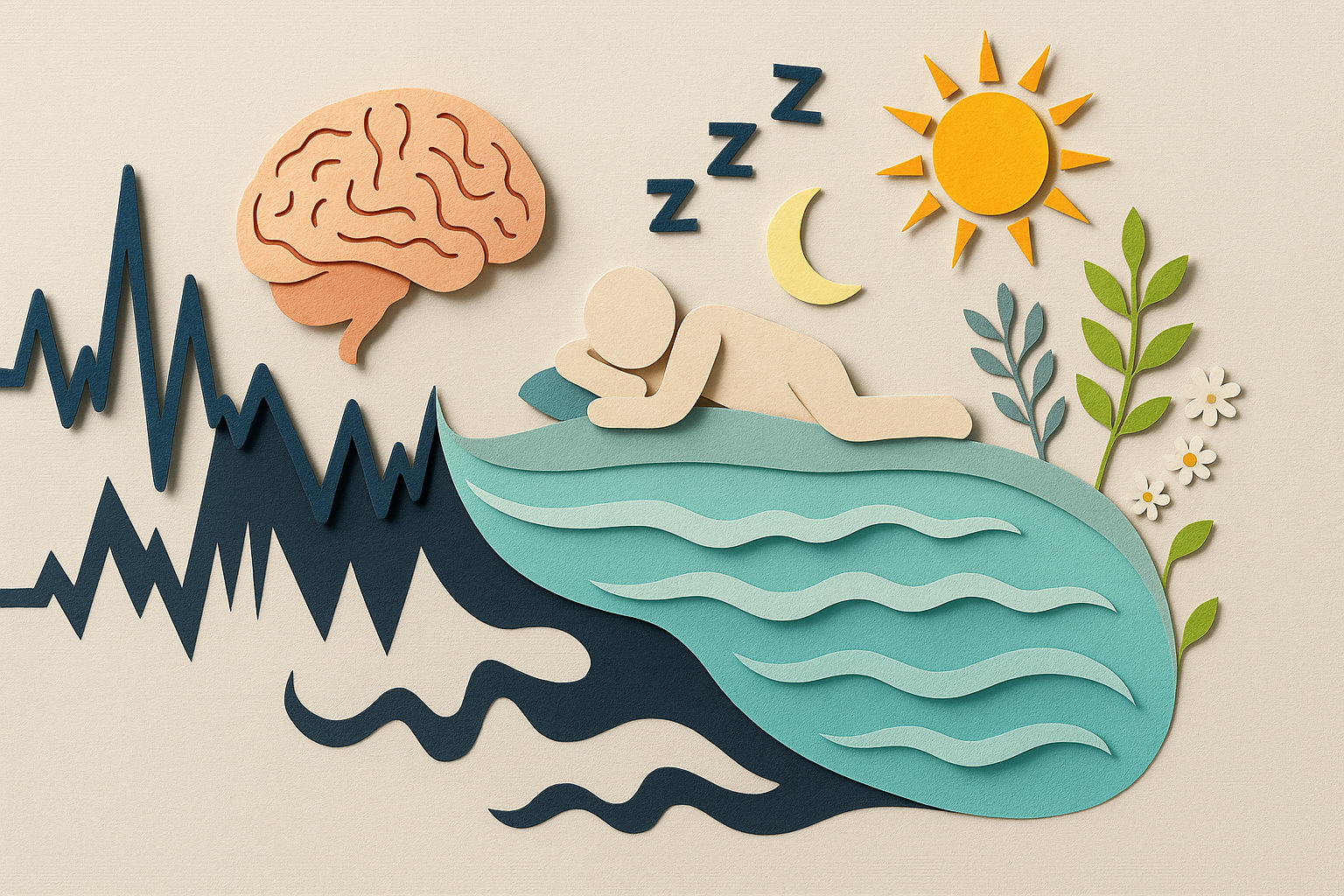Your Nightmares Aren't Predicting Your Future
Discover how to address chronic nightmares by restoring natural sleep rhythms, without resorting to medication. Embrace healthier sleep for emotional healing.


We've reached a strange place in modern health reporting where even nightmares get reduced to clickbait.
A recent headline declared that chronic nightmares might be "an early warning sign of dementia." The implication? If you're dreaming vividly or uncomfortably, your brain may already be unraveling.
No mention of why it's happening. No practical guidance. Just another fear-based headline engineered to reinforce the myth that pharmaceuticals are your only option.
But this approach misses the point entirely. It doesn't help you understand your body. It doesn't empower you to heal.
Nightmares aren't omens. They're signals.
The Real Story Behind Your Restless Nights
When someone experiences frequent nightmares, we shouldn't immediately leap to diagnosing disease. We should ask why the REM cycle is failing.
Nightmares are rarely the enemy themselves. They're your brain's desperate attempt to complete a process of memory reprocessing that's been interrupted.
The real culprit? A broken rhythm.
REM sleep isn't just the dream stage. It's the emotional processing and integration stage where your brain consolidates memories, smooths out emotional triggers, and rebalances neural activity.
This happens through a unique brainwave interaction called theta-gamma coupling. Theta waves from your hippocampus synchronize with cortical gamma waves to allow recent, emotionally charged experiences to be "filed" appropriately.
Think of it as untagging threats and softening emotional intensity.
Disrupt this rhythm through chronic stress, overactivation of your amygdala, or REM-suppressing medications, and you don't just lose sleep. You lose your brain's built-in mechanism for emotional healing.
When Your Symphony Falls Out of Tune
The patterns are predictable. Sleep-wake cycles become chaotic. Going to bed at midnight one night, 10 PM the next.
Waking at 6 AM all week for work, then sleeping until 9 AM because you "need to recover." Chronic 2-4 AM wake-ups where you can't fall back asleep.
Sleeping 7-9 hours but still feeling exhausted. Poor heart rate variability if you track it.
This is rhythm collapse, not aging.
The environment that breeds nightmares combines sleep debt with emotional overload. Chronic stress at work or family. High-stakes situations like disaster relief or mission work.
When you lose REM sleep, you lose the ability to "recontextualize" emotional events from your day. The first emotional memory your brain tries to process surges adrenaline, and you wake up.
Your nervous system has lost its ability to self-regulate.
Why Modern Medicine Gets It Backwards
The first response from most providers? Drugs.
Prazosin to suppress nightmares. Ambien and Lunesta to force sedation. Benadryl to "knock you out."
But these medications aren't restoring REM. They're overriding it.
We've normalized "knocking people out" as treatment. But sleep isn't unconsciousness. It's an orchestrated neurological symphony.
Blunting it with drugs is like treating a symphony by stuffing a pillow in the piano. It may quiet the noise, but it kills the music.
Prazosin works by cutting stress at its source, the alpha-1 adrenergic receptor. It reduces hyperactivation in your amygdala and locus coeruleus, calming nightmares. But it's not subtle.
It flattens your response without correcting the rhythm.
Ambien and Lunesta are worse. They sedate your cortex while often suppressing REM entirely, interfering with emotional recalibration and memory formation.
Benadryl blocks acetylcholine, a neurotransmitter essential to dream-state integrity. Regular use carries long-term cognitive risks.
This isn't medicine. It's pharmacological noise reduction.
What the Research Actually Reveals
The Lancet study everyone's talking about found that middle-aged participants experiencing weekly nightmares were four times more likely to experience cognitive decline.
But here's what the headlines missed: chronic sleep loss is a guaranteed predisposition for dementia regardless of nightmares.
This study is a small confirmation of that fact, not proof that nightmares cause dementia.
The real insight lies in understanding why this connection exists. Your brain's theta-gamma coupling increases nine-fold during REM sleep compared to wakefulness. This intricate process supports information transfer and emotional memory filing.
When this system breaks down, emotional memories remain unprocessed. Stress hormones stay elevated. Neuroinflammation increases.
The nightmare isn't the problem. The rhythm disruption is.
Restoring Your Natural Sleep Symphony
Sleep is supposed to be an unconscious symphony that occurs because of what happens during your day.
NREM deep sleep is the reparative stage. Muscle tissue signals growth hormone for repair. This growth hormone, stimulated by muscle exertion throughout your day, determines the level that reaches your hypothalamus at night when melatonin brings you into restful sleep.
NREM also supports immune repair and restoration. If there's too much inflammation in your brain to complete during several hours of NREM, your brainwaves can't cycle into REM appropriately.
You wake up because the first emotional memory you process surges adrenaline.
To restore the symphony, you need to restore day-night rhythms. Exercise with muscle exertion and walking. Routine throughout your day. Evening rituals with calming influences.
Morning light exposure triggers cortisol and anchors your circadian clock. Evening dimming and herbal support reactivate melatonin, downshift your nervous system, and prepare for emotional processing.
Breathwork, stillness, movement, and nourishment. A rhythm reset, not a prescription.
Ancient Wisdom Meets Modern Neuroscience
When you step back from reductionist medicine, a world of tools opens up. Tools that cultures have trusted for thousands of years.
Kava works through GABA-A modulation and mild norepinephrine inhibition. It gently sedates without altering REM, inviting emotional repair instead of suppressing it.
Cherokee traditions carried similar tools. Herbs like skullcap, passionflower, valerian, and wild lettuce brewed as teas. Not to sedate, but to recalibrate.
These weren't just sleepytime herbs. They were modulators of memory, stress, and nervous system tone.
Research confirms that breathing frequencies directly influence this neural symphony. Theta-gamma coupling strength peaks at 4-6 Hz breathing rates.
This reveals why breathwork and circadian rhythm restoration address root causes rather than symptoms.
The Timeline of Transformation
Your brain wiring can take time to "exercise" back onto a proper course. It takes work like tuning an instrument.
The more you use it, the more it can fall out of tune. But if you get it tuned up and learn how to keep it tuned, you'll be playing beautiful harmony.
Improvements happen within months, not weeks.
The first signs are feeling more rested or sleeping past 3 AM without waking. This turns into brighter affect, more lively mood, and more robust awareness of your environment.
You see colors better. You're more interested in things. You feel more alive and less muted overall.
Advanced therapies like qEEG brain mapping, neurofeedback, hyperbaric oxygen therapy, and metabolic testing can accelerate this process. But the foundation remains rhythm restoration.
Become the Hero of Your Own Health
It's entirely up to you.
Unfortunately, our communities and families lost this information because medicine, agriculture, and our environment changed toward marketing, gimmicks, and traps designed to keep you guessing long enough that you get sick.
You must understand: nightmares are just more intense versions of the weird plots and connections that dreams are made of. They're nothing to be afraid of in themselves.
They are a sign that your sleep quality needs attention.
Don't buy the medication approach you've been marketed. Sleep supplements and nutrients like magnesium and herbal combinations can help, but they're usually not enough to change the underlying rhythm.
Dementia involves a whole host of mechanisms, and sleep is just one potential canary in the coal mine. If you want to decrease early cognitive decline, you must account for everything happening in your brain, gut, blood, movement capacity, socialization, and the totality of how you live.
Balance the majority of those, and your brain will stay sharp into very old age.
Just because you have nightmares or carry the ApoE gene or whatever else gets amplified in media coverage, none of those give you a prognosis of likely decline.
Listen to your body and take action at the first sign of rhythm disruption. Your nightmares aren't predicting your future.
They're showing you the path to restore it.
Ready to feel like you again?
* Your next step toward feeling better starts today. At The Dearing Clinic we make it simple to get started with care that truly fits your life. Book your visit now and let’s design a plan that restores your energy, relieves your pain, and helps you enjoy more of what matters most.


